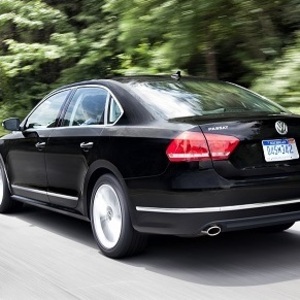US EPA busts VW on diesel emissions cheat device; VW responds

Photo: Volkswagen of America Inc.
September 21, 2015
BY Ron Kotrba
The U.S. EPA issued a notice of violation (NOV) of the Clean Air Act on Sept. 18 to Volkswagen AG, Audi AG, and Volkswagen Group of America Inc. alleging that four-cylinder Volkswagen and Audi diesel cars from model years 2009-‘15 include software that circumvents EPA emissions standards for nitrogen oxides (NOx), a pollutant conventionally thought to be a major contributor to ground level ozone and smog formation.
According to the EPA, Volkswagen installed a sophisticated software algorithm on certain vehicles that detects when the car is undergoing official emissions testing, and turns on full emissions controls only during the test. EPA says pollution control on these vehicles is significantly reduced during normal driving conditions, emitting up to 40 times the standard for NOx. The software produced by Volkswagen is what the CAA defines as a “defeat device.” By making and selling vehicles with defeat devices that allowed for higher levels of air emissions than were certified to EPA, Volkswagen violated two important provisions of the Clean Air Act.
California is separately issuing an In-Use Compliance letter to Volkswagen, and EPA and the California Air Resources Board have both initiated investigations based on Volkswagen’s alleged actions.
Advertisement
EPA and CARB uncovered the defeat device software after independent analysis by researchers at West Virginia University, working with the International Council on Clean Transportation, a nongovernmental organization, raised questions about emissions levels, and the agencies began further investigations into the issue.
In September, after EPA and CARB demanded an explanation for the identified emission problems, Volkswagen admitted that the cars contained defeat devices.
“Using a defeat device in cars to evade clean air standards is illegal and a threat to public health,” said Cynthia Giles, assistant administrator for EPA’s Office of Enforcement and Compliance Assurance. “Working closely with the California Air Resources Board, EPA is committed to making sure that all automakers play by the same rules. EPA will continue to investigate these very serious matters.”
“Working with U.S. EPA we are taking this important step to protect public health thanks to the dogged investigations by our laboratory scientists and staff,” said CARB’s Executive Officer Richard Corey. “Our goal now is to ensure that the affected cars are brought into compliance, to dig more deeply into the extent and implications of Volkswagen’s efforts to cheat on clean air rules, and to take appropriate further action.”
The allegations cover roughly 482,000 diesel passenger cars sold in the U.S. since 2008.
Affected diesel models include:
-Jetta (2009-‘15)
-Beetle (2009-‘15)
-Audi A3 (2009-‘15)
-Golf (2009-‘15)
-Passat (2014-‘15)
Advertisement
VW may be liable for civil penalties and injunctive relief for the violations alleged in the NOV.
EPA stated, “It is incumbent upon Volkswagen to initiate the process that will fix the cars’ emissions systems. Car owners should know that although these vehicles have emissions exceeding standards, these violations do not present a safety hazard and the cars remain legal to drive and resell. Owners of cars of these models and years do not need to take any action at this time.”
In response to the NOV, Volkswagen AG’s CEO Martin Winterkorn, said, “The board of management at Volkswagen AG takes these findings very seriously. I personally am deeply sorry that we have broken the trust of our customers and the public. We will cooperate fully with the responsible agencies, with transparency and urgency, to clearly, openly, and completely establish all of the facts of this case. Volkswagen has ordered an external investigation of this matter. We do not and will not tolerate violations of any kind of our internal rules or of the law. The trust of our customers and the public is and continues to be our most important asset. We at Volkswagen will do everything that must be done in order to reestablish the trust that so many people have placed in us, and we will do everything necessary in order to reverse the damage this has caused. This matter has first priority for me, personally, and for our entire board of management.”
*Editor's Note: On Sept. 23, Winterkorn announced he was resigning as Volkswagen's CEO.
Related Stories
The U.S. Department of Energy on May 30 released an updated version of its 45ZCF-GREET modeling tool to account for new feedstocks and methods of production, including ethanol from corn wet-milling and natural gas from coal-mine methane.
Moeve has reached a strategic agreement with Grupo Armas Trasmediterránea to supply 2G marine biofuels in the Canary Islands, with approximately 40,000 tons to be delivered through December 2025 under a long-term contract.
Castle & Cooke Aviation, a premier provider of luxury FBO services, now offers sustainable aviation fuel (SAF) from Avfuel Corp. at Van Nuys Airport (VNY) in Southern California. The SAF produced by Neste.
Editor's note from the Summer 2025 issue of Biodiesel Magazine
Legislation pending in the Illinois legislature aims to create a clean transportation standard (CTS) that would require a 25% reduction in in the lifecycle carbon intensity (CI) of ground transportation fuels within a 10-year period.
Upcoming Events










